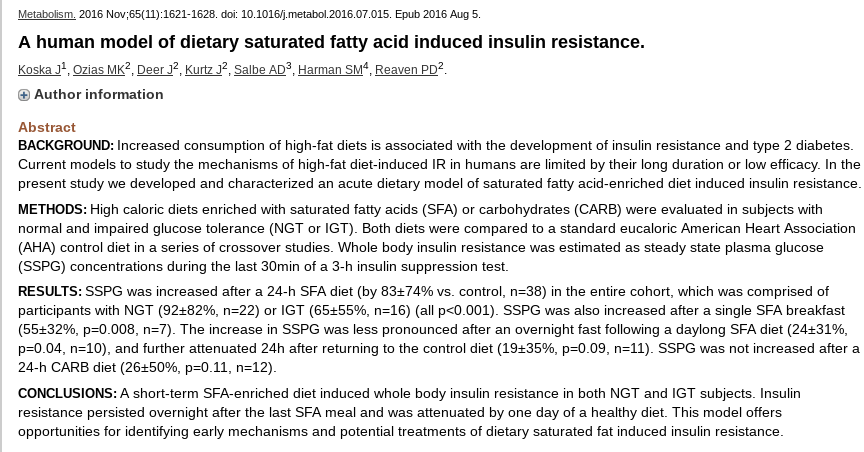In previous posts I have laid out the argument that metabolism of long chain saturated fat creates mitochondrial ROS which causes short term insulin resistance while the saturated fat is oxidized. Insulin tells the bodies cells to switch from fat metabolism to glucose metabolism and causes fat cells to absorb glucose, convert it to fat and store. I’ve argued that the short term, reversible, insulin resistance allows fat cells to continue running on their own stored fat rather than immediately switch to burning glucose as soon as insulin rises. I’ve argued that the insulin resistance gotten by oxidizing saturated fat in the presence of insulin allows individual cells “metabolic flexibility” – the ability to tap into fat stores even when there is the option to burn glucose.
That is the theory. The next several posts we will look at evidence from the scientific literature that support the theory. The first step is to show that “physiological insulin resistance” is even a real thing in humans and can be caused by oxidizing saturated fat.

https://www.ncbi.nlm.nih.gov/pubmed/27733250
Lets translate this into English. Study participants ate either a high carbohydrate diet or a high saturated fat diet for 24 hours. The people who ate the saturated fat diet had higher blood sugar during an insulin suppression test. They had physiological insulin resistance.
Is there any sign that this short term insulin resistance was leading the volunteers on a pathway towards type 2 diabetes? To quote the authors, “Insulin resistance persisted overnight after the last SFA (Saturated Fatty Acid) meal and was attenuated by one day on a healthy diet.” The authors and I differ over what constitutes a “healthy” diet, but what we agree on is that the insulin resistance brought about by increasing saturated fat consumption is ephemeral in nature. Hence the term “physiological insulin resistance”, the insulin resistance is a short lived response to a specific dietary pattern in this case. There’s no reason to expect any long term effect.
Now let’s think about what’s happening to the blood sugar. The people eating the saturated fat diet had higher blood sugar. Why? Their fat cells were not responding to insulin, therefore they were not taking in sugar and turning it into fat (de novo lipogenesis).

Where is the glucose going if it’s not going into fat cells?
Is the insulin resistance in type 2 diabetes different compared to physiological insulin resistance?
It’s not entirely clear where all of the glucose goes, but glucose is taken up by muscle cells, brain cells and intestinal cells, for instance. There is also evidence that mice given a high saturated fat diet upregulate a protein called Glut1 that allows the fat cells to uptake glucose while ignoring the other effects of insulin.
And physiological insulin resistance is very different from type 2 diabetes. For instance, it goes away if you stop eating saturated fat.
Brad